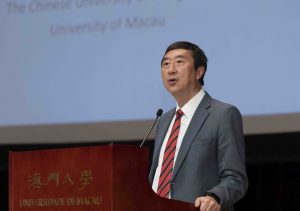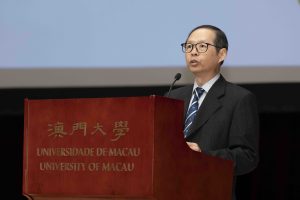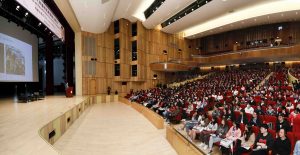The University of Macau (UM) today (22 February) held a UM Doctor honoris causa Lecture, titled ‘Healthcare and Education in the Era of Artificial Intelligence’. Prof Joseph Sung, an honorary doctor of UM and a world-renowned scientist, was the keynote speaker. The talk attracted many UM students, secondary school teachers and students, experts, scholars, industry practitioners, and prominent members of the community. During the talk, Prof Sung envisioned a future where artificial intelligence is inextricably linked to one’s everyday life and what one can do to ensure healthy development physically, emotionally, and spiritually in an era of artificial intelligence.
Prof Billy So, vice rector of UM, enumerated Prof Sung’s significant contributions to higher education and medical studies and praised him for his heroic fight against the severe acute respiratory syndrome (SARS) in 2003, which earned him the title ‘Asian Hero’ from Time magazine. During Prof Sung’s tenure as the vice-chancellor and president of the Chinese University of Hong Kong, he realised his educational aspirations, including deepening and expanding college education, implementing the 3+3+4 academic structure, promoting the internationalisation of CUHK, and establishing the CUHK Shenzhen branch and the CUHK Medical Centre. His achievements have gained him recognition and praises from Hong Kong, mainland China, and the international community.
During the talk, Prof Sung discussed how artificial intelligence can assist medical professionals to make more accurate diagnosis. For instance, when performing MRI scans, AI-based technology can help to improve the quality of diagnostic images, thereby enabling more accurate analysis with much less time. Another example is robotic surgery. AI-assisted robotic surgery can eliminate problems that sometimes occur with surgeries performed by human hands, such as blurry vision, physiological tremors, and fatigue on the part of the doctors, while ensuring smaller and more accurate incisions. Moreover, AI can predict an individual’s chances of suffering from a disease based on his or her physiological data as well as mental and emotional health. However, as Prof Sung pointed out in the lecture, AI cannot solve all the problems in healthcare or replace medical professionals, because of the many challenges of using AI in medicine, such as ensuring data security for privacy and securing trust in the use of the technology. In view of the imminent revolutionary changes, he suggested that governments and various parties concerned should have an in-depth discussion on how to prepare for the sea change.
Observing the impact of the popularisation of AI technologies on today’s youth, Prof Sung summarised the five essential skills in the era of AI with five Cs, namely critical thinking, collaborative spirit, communication skills, confidence in themselves, and compassion for others.
Prof Sung, together with his research team, has pioneered several projects, the results of which have brought about profound changes in the practice of gastroenterology worldwide. Prof Sung is the recipient of many prestigious awards, including the Laurel Award from the Prevent Cancer Foundation of the United States in 2008, the Marshall and Warren Lecture Award and the Endoscopy Award of the German Society of Gastroenterology in 2009, the Master of the World Gastroenterology Organization (WGO) Award from the WGO and WGO Foundation in 2013, and the International Herbert Falk Award in 2017.
Source: Communications Office
Media Contact Information:Communications Office, University of Macau
Albee Lei Tel:(853) 88228004Kelvin U Tel:(853) 88224322Email:prs.media@um.edu.moUM Website:www.um.edu.mo




